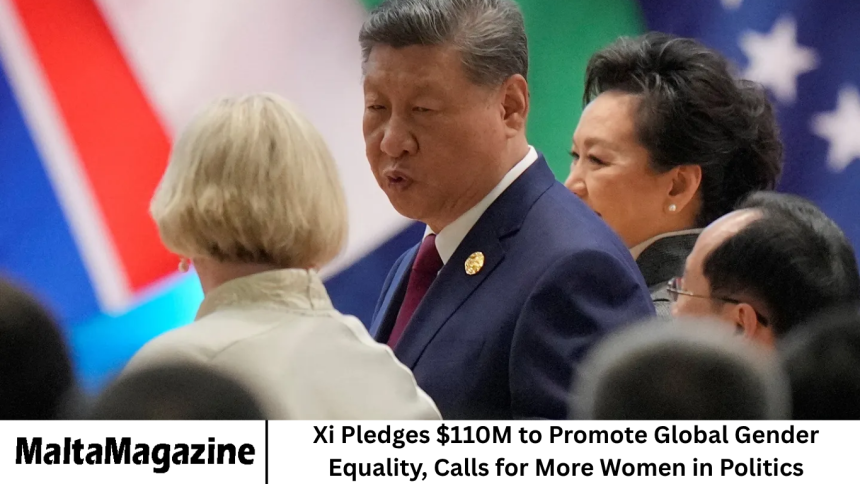In a significant move that underscores China’s growing involvement in global development and social issues, Chinese President Xi Jinping has pledged $110 million to support international efforts promoting gender equality and women’s empowerment.
- A Legacy of Advocacy: China’s Role in Women’s Empowerment
- Xi’s Vision: Empowering Women as Global Change-Makers
- Global Response: Support and Skepticism
- The $110 Million Fund: How It Will Be Used
- Women’s Leadership Programs:
- Educational Access and STEM Empowerment:
- Economic Empowerment Projects:
- Health and Well-Being Initiatives:
- Gender-Based Violence Prevention:
- Digital Inclusion and Innovation:
- Global Partnerships and Research:
- Women in Politics: The Push for Representation
- Economic Equality: Empowering Women as Drivers of Growth
- Cultural and Social Impact: Changing Perceptions of Women’s Roles
- Challenges Ahead: Turning Pledges into Progress
- A Global Turning Point for Gender Equality
- Frequently Asked Question
- Conclusion
The announcement, made at a recent global forum on women’s rights and development, marks a reaffirmation of China’s stance on women’s advancement—not only within its borders but across the world.
Xi’s statement emphasized the importance of women taking a greater role in political, economic, and social decision-making, aligning with long-term global goals such as those outlined in the United Nations’ Sustainable Development Goals (SDGs).
More Read: Lecornu Forms Second Government Within a Week as Political Turmoil Deepens
A Legacy of Advocacy: China’s Role in Women’s Empowerment
President Xi’s recent remarks build on a legacy that dates back to China’s role in the 1995 Fourth World Conference on Women held in Beijing. That event produced the landmark Beijing Declaration and Platform for Action, one of the most progressive blueprints for gender equality in modern history.
Since then, China has frequently referenced the Declaration as a guiding document for its domestic and international gender policies. Over the past two decades, the Chinese government has implemented measures to expand educational opportunities for women, improve maternal healthcare.
And increase women’s participation in the labor force. Xi’s $110 million pledge represents a continuation of that legacy, reinforcing China’s desire to play a leading role in shaping the global gender equality agenda.
The funds are expected to be allocated toward a mix of capacity-building programs, educational initiatives, and women’s leadership development projects, particularly in developing nations that face systemic gender imbalances.
Xi’s Vision: Empowering Women as Global Change-Makers
During his speech, Xi highlighted that women are essential contributors to social progress, economic growth, and global peace. He stressed that empowering women is not merely a moral imperative—it’s a strategic necessity for sustainable development.
“Without women, there would be no human civilization. Without progress for women, there would be no progress for humanity,” Xi stated during his address. He called upon world leaders to increase women’s representation in political institutions.
Ensuring that women have an equal voice in crafting laws and policies that affect their lives. Xi also encouraged private-sector organizations to create more equitable workplace environments, offering women fair access to leadership positions and professional development opportunities.
His remarks echoed the principles of inclusive governance, suggesting that societies prosper when leadership reflects the diversity of the populations they serve. Xi’s proposal seeks to inspire a global coalition—one that empowers women not as beneficiaries of aid, but as active architects of the future.
Global Response: Support and Skepticism
Xi’s announcement has garnered mixed reactions on the international stage. Many global organizations, including UN Women and various NGOs, have welcomed the pledge as a timely boost to international gender equality initiatives that have faced funding shortages in recent years.
Phumzile Mlambo-Ngcuka, former Executive Director of UN Women, praised China’s financial contribution, calling it “an important gesture of global solidarity in advancing women’s rights.”
She emphasized that such contributions are essential to revitalizing programs that target gender-based violence, economic inclusion, and access to education for girls in developing countries.
However, some critics have expressed caution, pointing out that China itself still faces challenges regarding gender representation and workplace equality. While women in China have made significant gains in education and entrepreneurship, they remain underrepresented in top political positions and corporate leadership roles.
Human rights advocates have urged that China’s domestic policies should mirror its international commitments, suggesting that genuine progress must begin at home.
Nonetheless, the pledge represents a symbolic and strategic move, positioning China as a global leader in gender discourse—a role traditionally dominated by Western nations.
The $110 Million Fund: How It Will Be Used
Although detailed allocation plans have not been fully disclosed, early reports suggest that China’s $110 million fund will be divided into several key focus areas aimed at strengthening the global gender equality ecosystem.
Women’s Leadership Programs:
Initiatives to train and mentor women for leadership roles in politics, business, and civil society. This may include scholarships, exchange programs, and leadership academies.
Educational Access and STEM Empowerment:
Funding to promote girls’ participation in science, technology, engineering, and mathematics (STEM) disciplines—fields where women remain vastly underrepresented globally.
Economic Empowerment Projects:
Support for women entrepreneurs through microfinance opportunities, business training, and access to global trade networks.
Health and Well-Being Initiatives:
Efforts to improve maternal health, reproductive rights, and access to healthcare in underserved regions.
Gender-Based Violence Prevention:
Collaborative projects with NGOs and international agencies to combat domestic violence, trafficking, and workplace harassment.
Digital Inclusion and Innovation:
Programs to help women adapt to the digital economy, bridging the technological divide that often leaves women behind.
Global Partnerships and Research:
Support for research institutions studying gender dynamics and developing evidence-based solutions for equality.
This multi-dimensional approach reflects a recognition that gender equality is not a single-issue cause, but rather a complex intersection of education, economics, health, and governance.
Women in Politics: The Push for Representation
Xi’s call for greater female participation in politics underscores an issue that transcends national borders. Despite decades of advocacy, women remain significantly underrepresented in political leadership positions worldwide.
According to data from the Inter-Parliamentary Union (IPU), women occupy roughly 27% of parliamentary seats globally—a number that, while improved, still falls short of parity. China’s own figures mirror this global trend. In the National People’s Congress, women account for about 25% of representatives.
And fewer hold high-ranking positions within the Communist Party hierarchy. Xi’s call to change this dynamic signals a potential shift in the political narrative—one that may encourage local governments and organizations to implement more inclusive recruitment and leadership policies.
Globally, the pledge is expected to strengthen efforts by countries that have committed to achieving gender parity in political representation. Programs funded by the $110 million initiative could help women develop the skills, confidence, and networks needed to run for office and influence policy decisions.
Economic Equality: Empowering Women as Drivers of Growth
Xi’s speech also connected gender equality with economic prosperity, reflecting growing international recognition that empowering women benefits entire economies. Studies from the World Bank and McKinsey Global Institute have shown that advancing gender equality could add trillions of dollars to global GDP annually.
China’s own experience provides compelling evidence: as women’s participation in the workforce increased over the past four decades, so too did the country’s overall economic productivity. Today, women account for nearly 40% of China’s GDP, driven by rising participation in business and technology sectors.
The $110 million pledge aims to extend similar opportunities to women in developing nations, where barriers such as lack of education, unequal pay, and cultural constraints continue to limit potential.
Through targeted financial assistance and training, the initiative could empower women to become entrepreneurs, innovators, and policymakers, fostering a more resilient and balanced global economy.
Cultural and Social Impact: Changing Perceptions of Women’s Roles
Beyond economics and politics, Xi’s remarks addressed the cultural dimensions of gender equality. He stressed the importance of changing societal attitudes that continue to limit women’s roles in many communities.
Cultural transformation, he argued, is as essential as policy reform. This means promoting positive narratives about women’s leadership, encouraging shared domestic responsibilities, and dismantling stereotypes that confine women to specific social roles.
In China, government campaigns have already sought to elevate the status of women in media and education, emphasizing stories of female scientists, entrepreneurs, and public servants. The new funding could support similar awareness campaigns internationally, fostering a global shift in how societies perceive gender roles.
Challenges Ahead: Turning Pledges into Progress
While Xi’s pledge is ambitious, its success will depend heavily on implementation and accountability. Past global initiatives for gender equality have often struggled with coordination, transparency, and measurable outcomes.
Experts argue that for this fund to make a meaningful impact, it must be collaborative and data-driven. Partnerships with organizations such as UN Women, the World Bank, and regional development agencies will be crucial to ensure resources reach communities most in need.
Additionally, clear performance metrics—such as the number of women trained, policies enacted, or institutions reformed—will help maintain credibility and track progress over time.
Xi’s challenge now lies in transforming financial promises into tangible outcomes, bridging the gap between political rhetoric and real-world change.
A Global Turning Point for Gender Equality
The timing of Xi’s announcement aligns with growing global momentum for gender reform. From movements like #MeToo to international campaigns advocating for equal pay, gender equality has become one of the defining issues of the 21st century.
By joining this conversation with a significant financial commitment, China positions itself not just as a participant, but as a leader in the global effort to empower women. The $110 million pledge represents more than just monetary aid.
It signals a philosophical shift, acknowledging that progress for women is inseparable from progress for humanity. If implemented effectively, Xi’s initiative could mark a historic moment in the global pursuit of equality.
One that bridges nations, cultures, and ideologies in pursuit of a shared vision: a world where every woman has the opportunity to lead, contribute, and thrive.
Frequently Asked Question
What is the purpose of Xi Jinping’s $110 million pledge?
The pledge aims to promote global gender equality through programs that empower women in leadership, education, and economic participation. The funds will support initiatives across various sectors, particularly in developing countries.
How does this initiative relate to China’s past efforts on gender equality?
It builds on China’s legacy from the 1995 Beijing Declaration, which remains a cornerstone of global gender policy. The new fund continues China’s tradition of supporting women’s empowerment at both domestic and international levels.
What areas will benefit most from the funding?
The funds will be used for women’s leadership programs, STEM education, economic empowerment, health initiatives, and campaigns against gender-based violence.
Will the fund only support projects within China?
No. The initiative is global in scope, with a focus on developing nations and multilateral partnerships that foster cross-border cooperation on women’s rights.
How does China perform in terms of women’s political representation?
Women make up about 25% of China’s National People’s Congress, which is below global parity targets. Xi’s call for increased representation may lead to new policies encouraging women’s political participation.
What challenges could affect the success of this initiative?
Potential challenges include ensuring transparency, effective allocation of funds, and measurable outcomes. Sustained international collaboration will be crucial for success.
Why is women’s political participation so important?
Women’s involvement in politics leads to more inclusive and representative governance. It ensures that policies reflect diverse perspectives, fostering fairness, equity, and long-term social progress.
Conclusion
President Xi Jinping’s $110 million pledge to promote global gender equality is both a symbolic and strategic milestone. It aligns China with international efforts to advance women’s rights while urging greater female participation in leadership roles.
Though challenges remain—both domestically and globally—this initiative underscores an essential truth: gender equality is a universal cause that transcends borders. By investing in women’s potential, societies not only uphold justice but also unlock the keys to sustainable development.









